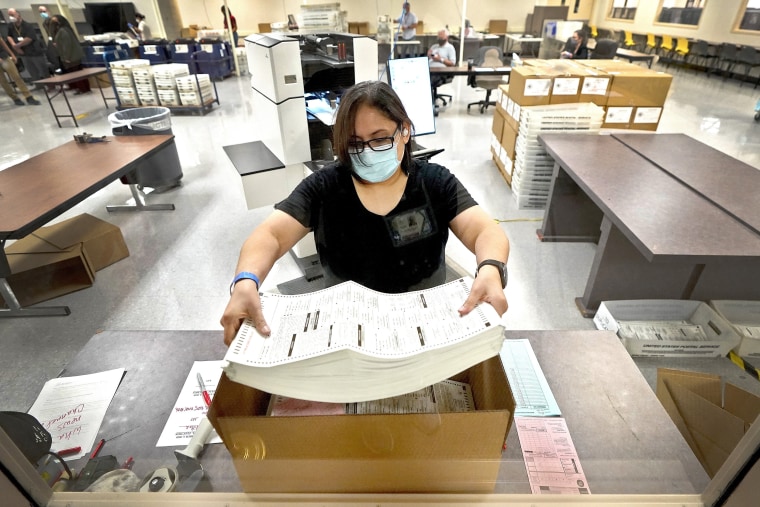WASHINGTON — Supreme Court justices asked skeptical questions Tuesday about Arizona election laws in a case that has emerged as an important test of the Voting Rights Act.
The case is about whether two state laws violate Section 2 of the act: One blocks the counting of ballots cast in the wrong precinct, and another prohibits anyone other than a family member or caregiver from collecting and delivering a voter’s absentee ballot.
On one side is the state of Arizona and Republicans, who want to keep the strict laws on the books and argue they prevent fraud. And on the other side are Democrats, who want the laws stricken and argue the rules prevent voters, particularly minorities, from accessing the ballot.
The voting restrictions are being fought in a state where Republicans have dominated local and national races for generations but where recently Democrats have gained traction and won both U.S. Senate seats and the presidential contest last year. The outcome of the case could have far-reaching implications for voting laws in other states, too.
Chief Justice John Roberts and Justice Amy Coney Barrett, two Republican appointees and potentially pivotal votes in the case, appeared to be wrestling with the arguments as they asked tough questions of lawyers on both sides.
Roberts asked the Arizona GOP lawyer, who is defending the laws, why it's "a bad thing" for election procedures to seek "racial proportionality."
Later, he pressed the Democrats' lawyer to define what it would take in their opinion to make a law unacceptable. "What if the provision results in a 1 percent decline in participation by minority voters — is that substantial enough?" he asked.
Barrett told Arizona's state lawyer that there were "some contradictions" in his argument and that his task was to show why the changes in laws preserved equal "opportunity" for white and nonwhite voters.
But later, she appeared torn about whether Arizona's laws cross the line. "There's a difficulty that the statutory language and its lack of clarity presents in trying to figure out when something crosses from an inconvenience to a burden," Barrett said.
Roberts and Barrett, plus the other two justices appointed by former President Donald Trump, Neil Gorsuch and Brett Kavanaugh, are likely to be the deciding votes in the case.
A significant moment during virtual arguments came when Arizona GOP lawyer Michael Carvin connected the validity of the Republican-backed laws to the party’s interest in winning elections.
When asked by Barrett what the state Republican Party's interest in the case was, he replied: “Because it puts us at a competitive disadvantage relative to Democrats. Politics is a zero sum game. And every extra vote they get through unlawful interpretations of Section 2 hurts us. It's the difference between winning an election 50-49 and losing an election.”
None of the three Trump-appointed justices were on the Supreme Court eight years ago when it last delivered a landmark opinion on the Voting Rights Act, minimizing the impact of Section 5, which made certain that states with a history of discrimination get permission to change voting laws. At the time, Roberts wrote the 5-4 ruling, arguing that conditions had improved in the South and that the formula for burdening the states was invalid.
Kavanaugh, echoing Barrett, said there's "murkiness" about the limits of the Voting Rights Act law.
Gorsuch sounded more sympathetic to Arizona's laws. At one point he pressed a lawyer challenging the provisions to concede that the state has an interest in preventing ballot fraud.
Justice Elena Kagan asked the lawyers about three hypothetical changes to voting laws: eliminating all Sunday voting (while observing that Black Americans vote at far higher rates on Sunday), moving all polling places to a country club (and away from minority neighborhoods), and changing voting hours to 9 a.m. to 5 p.m. (when working class voters are at their jobs).
"These are all hypotheticals that have never existed in the real world," Carvin said at one point, sounding frustrated with the line of questioning.
Carvin argued the universe of laws that are invalid under Section 2 of the Voting Rights Act is "extraordinarily limited." He said the question is not about "outcome" but rather if the law imposes unequal "opportunity" for white and nonwhite voters, without regard to socioeconomic differences.
A contentious moment came when Justice Sonia Sotomayor pressed Carvin to explain why a government that severely restricts voting options in minority areas wasn't denying a right to vote.
"If you just can't vote for those reasons and you're not, and your vote is not being counted you've been denied the right to vote, haven't you?" she asked.
"I don't think anyone would say you've been denied a due process right to a hearing," Carvin said.
"This is not a due process claim," Sotomayor interrupted. "You’re denied something if you’re not given the right to vote … from circumstances that the state could remedy easily."

